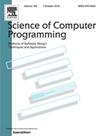Design patterns applied in the development of serious games for cognitive-affective training
IF 1.4
4区 计算机科学
Q3 COMPUTER SCIENCE, SOFTWARE ENGINEERING
引用次数: 0
Abstract
Game developers have been widely adopting software design patterns (SDPs) for their usefulness in providing maintainability, scalability, and adaptability to their software products. Nevertheless, their systematic application to cognitive-affective training in the context of Serious Games (SG) has not been explored. In turn, the definition of a Cognitive-Affective model (COGAF) for SGs facilitates their use in training cognitive and affective aspects in users. This article focuses on integrating SDPs into the COGAF model to facilitate the development of SGs. The paper presents four design patterns to simplify SG development based on the COGAF model. The SDPs used in the COGAF model create a set of Java classes, which embody the architectural principles of Serious Game Design Patterns (SGDP) for cognitive-affective training. Integrating design patterns (Template Method, Factory Method, Composite, and Strategy) in COGAF contributes to the organization, reuse and maintenance of code in SGs, reducing development complexity. We validate our proposal in four ways, the first with a case study involving user interaction in SGs, the second by implementing competency questions, the third, by assessing the usability and subjective player experience, and the fourth is a statistical evaluation to assess the development times of SG developers using extended and classic COGAF. The results show that integrating design patterns into COGAF improves code organization, which translates into improved development times for SG developers. In turn, the quality and effectiveness of cognitive-affective training with the generated SGs are not affected, ensuring the coherence and completeness of the proposal.
设计模式在认知情感训练严肃游戏开发中的应用
游戏开发者一直在广泛采用软件设计模式(sdp),因为它们在为软件产品提供可维护性、可伸缩性和适应性方面非常有用。然而,它们在严肃游戏(SG)背景下的认知情感训练中的系统应用尚未被探索。反过来,认知-情感模型(COGAF)的定义有助于他们在训练用户认知和情感方面的使用。本文的重点是将sdp集成到COGAF模型中,以促进SGs的开发。本文提出了基于COGAF模型的四种简化SG开发的设计模式。COGAF模型中使用的sdp创建了一组Java类,这些类体现了用于认知情感训练的严肃游戏设计模式(Serious Game Design Patterns, SGDP)的架构原则。在COGAF中集成设计模式(模板方法、工厂方法、组合和策略)有助于在SGs中组织、重用和维护代码,从而降低开发复杂性。我们通过四种方式来验证我们的建议,第一种是关于《SGs》用户互动的案例研究,第二种是执行能力问题,第三种是通过评估可用性和主观玩家体验,第四种是使用扩展和经典COGAF来评估《SGs》开发者的开发时间。结果表明,将设计模式集成到COGAF中可以改善代码组织,从而改善SG开发人员的开发时间。反过来,生成的认知情感训练的质量和有效性不受影响,确保了建议的连贯性和完整性。
本文章由计算机程序翻译,如有差异,请以英文原文为准。
求助全文
约1分钟内获得全文
求助全文
来源期刊

Science of Computer Programming
工程技术-计算机:软件工程
CiteScore
3.80
自引率
0.00%
发文量
76
审稿时长
67 days
期刊介绍:
Science of Computer Programming is dedicated to the distribution of research results in the areas of software systems development, use and maintenance, including the software aspects of hardware design.
The journal has a wide scope ranging from the many facets of methodological foundations to the details of technical issues andthe aspects of industrial practice.
The subjects of interest to SCP cover the entire spectrum of methods for the entire life cycle of software systems, including
• Requirements, specification, design, validation, verification, coding, testing, maintenance, metrics and renovation of software;
• Design, implementation and evaluation of programming languages;
• Programming environments, development tools, visualisation and animation;
• Management of the development process;
• Human factors in software, software for social interaction, software for social computing;
• Cyber physical systems, and software for the interaction between the physical and the machine;
• Software aspects of infrastructure services, system administration, and network management.
 求助内容:
求助内容: 应助结果提醒方式:
应助结果提醒方式:


